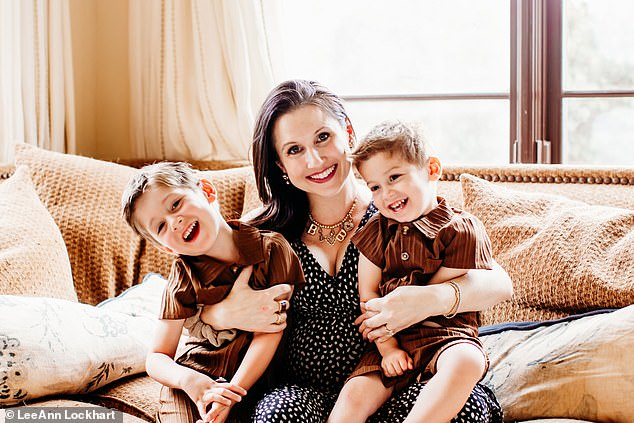When Tiffany Gaines fell pregnant with her first child shortly after the death of her mother, it sent her into a spiral of ‘ugly crying’ that lasted for days while she grappled with a ‘deep feeling of loss’.
These intense emotions were not, however, provoked by the fact that she was bringing her first child into the world without her mother by her side. The issue was that she was expecting a boy – and the same grief overwhelmed her again when she found out she was pregnant with her second son two years later.
This phenomenon is known as ‘gender disappointment’ – the ‘grief parents feel when their baby’s sex doesn’t match the hopes they had’ – and while it can apply to boys and girls, it’s male childrenwho appear to cause the most despondency.
It may be incomprehensible for women who would give anything just to conceive a healthy baby to hear mothers openly admitting that their hearts were so set on daughters.
Yet gender reveal videos on social media now commonly feature a woman collapsing into her husband’s armsafter popping a balloon packed with blue confetti, or breaking down at the sight of cobalt cake filling.
When asked to explain why the prospect of a son is so daunting, the reasons range from buying into clichés that boys are so much noisier and messier than girls, to fears about raising boys in a world where they will be influenced by toxic masculinity.
It was a sentiment echoed by pregnant comedian Katherine Ryan, who said she would be ‘dejected’ if her fourth child is a boy because her four-year-old son is already a ‘toxic male’ who play fights with swords.
Similarly,Love Island star Montana Brown,30, who shares two children withher fiancé Mark O’Connor, previously said she ‘cried when I found out that I was having a boy’, and had a ‘sinking feeling’.
One mother all too familiar with gender disappointment is Chloe, 40, from South London, who runs a parenting blog Sorry About The Mess,and has four sons, aged five, nine, 12 and 15.

Tiffany Gaines with her son Brighton, four, and Beau, two. She said that choosing positive names for her sons helped her cope with her gender disappointment

Chloe, who runs the blog Sorry About The Mess, and three of her children, pictured together
She told The Royale: ‘I still find it strange to think that I won’t have a daughter. I’m not cool with that, and it is still something I come back to every now and then, and I think I will do for the rest of my life.’
Chloe had always wanted a large family with her husband Sam, and ‘imagined I’d have a mix of both boys and girls in there’.
But during her third pregnancy, which she initially believed would be her last, the realisation hit her that she had just ‘one more shot to have a girl’.
‘At this point, I’d look at all-boy families and it would scare me a little. I’d think: “Oh that could be us, I’m not sure if I want that to be us”. I felt this strange aversion,’ she admitted.
‘So to avoid any feelings of disappointment crowding the early days with my new baby, I booked an early gender scan at 16 weeks – and the first dayafter finding out we were having another boy I was just excited.’
Yet during the next week, Chloe recalled how she had a ‘slow adjustment’ to the news, adding: ‘I had this dawningthat I would never have a daughter. That was hard to adjust to.
‘It was this loss of an idea that wasn’t going to happen anymore. I had to say goodbye to this image of a little girl I’d had.For me, this was quite a long process.’
Chloe admitted that her ‘feelings of sadness’ and ‘negative emotions’ were ‘strong and scary’ while she went througha ‘mourning phase’ for the girl she wasn’t going to have.
She explained how her feelings didn’t centre around wanting to buy dresses or do ‘girly things’ with a daughter. Instead she had no personal reference of what a family of boys could look like, having been raised in a female household.

For Chloe (pictured with three of her sons), she had always wanted a large family with her husband Sam, and ‘imagined I’d have a mix of both boys and girls in there’
The mother-of-four explained: ‘Gender disappointment isn’t about the baby you’re having, but about letting go of the possibility you imagined.
‘Our daughter has had a name since my first pregnancy. She isn’t an abstract concept. She is a very real idea. Someone Sam and I had both been imagining for years. Someone who I thought I would always meet.
‘Before the scan, both paths – boy or girl – feel real. Finding out means saying goodbye to the one that never was. For some, that goodbye is instant; for others, it takes time.
‘Let alone my own gender disappointment, I wasn’t able to shake the feeling that we were disappointing all the people around us who had already commented that they would like to see us have a girl.’
Chloe tried to bury her feelings but it was only when she gave herself the proper time to mourn the vision of the little girl she’d created that she finally moved forward.
‘By the end of my pregnancy, the feelings had well and truly cleared and made way for me to fully concentrate on looking forward to meeting our baby boy,’ said the parent.
‘For others experiencing gender disappointment, you won’t always feel so emotionally raw as you do now, despite it feeling like one of the worst feelings that you can have.

But during her third pregnancy, which Chloe (pictured with one of her sons) initially believed would be her last child for various reasons, the realisation hit her that she had just ‘one more shot to have a girl’
‘There was never any disappointment in my child at all, but a processing of the end of something you thought you might have, the closing of one door as another opens.I am lucky to have four sons with my husband, Sam, who I love and am grateful for.
‘It occupied a lot of brain space during the baby years. But now my children are older, and our family is complete (and perfect the way it is), I don’t think about it any more.’
Chloe isn’t alone in her feelings of gender disappointment, writerEilidh Dorgan, 36, who shares a daughter and a son with her husband, was taken aback when she first found out she was having a boy during her second pregnancy.
‘In my head, I’d had a dream of having two girls, believing that they’d be best friends and form some kind of unbreakable bond,’ she told The Royale.
‘The thought of having a boy was overwhelming, and I bought into all of the clichés: they have so much energy! There’d be sword fights everywhere! Not to mention the fact that I’ve overdosed oncrimepodcasts and know all too well that the root of many a serial killer’s evil stems from their mother.
‘And beyond accidentally creating a psychopath with body parts in his fridge, how do you even bring up a boy these days?
‘Young men have so many conflicting things shoved on them by society – that they should be masculine, but not too masculine, assertive without bullying anyone. Make the first move, but ask for consent first! The prospect of raising a man felt like a minefield.’
However, like Chloe,Eilidh’s mixed emotions soon vanished once her son was born, with the writer insisting: ‘It didn’t take long for my concerns to melt away.

Chloe isn’t alone in her feelings of gender disappointment, writer Eilidh Dorgan (pictured with her two children) was taken aback when she first found out she was having a boy during her second pregnancy
‘He’s not just a boy, he’s my son – and he’s the sweetest, funniest little thing. He delights everyone he meets, and I couldn’t picture life without him – not to mention that the friendship he has with his big sister is far better than anything I had imagined when initially hoping for a girl.
‘Sometimes I feel bad about ever having had a preference, but I think that it’s part of human nature to have some kind of instinctive partiality to a specific outcome.
‘Ultimately, I think that these preferences are based on our own history and experiences, and that some of the greatest sources of joy come from the most unexpected of places.’
Meanwhile, Tiffany Gaines fromSanta Fe, California said that gender disappointment needs to be treated with compassion – describing it as a form of grief.
‘I ugly cried for days after finding out with each of my pregnancies that I was having boys,’ she said.
‘It was jarring. It was like I entered a weird ‘Freaky Friday’ dystopia where my identity flip-flopped right before my eyes.’
When she pictured herself as a ‘double boy mum’, she recalls thinking: ‘Who is this person and what did she do with my daughter?’
Tiffany admits that her feelings sound dramatic, but argues that all grief is.
‘It’s time we treat gender disappointment with the levels of compassion, patience and grace that we would for any other type of grief,’ she said.
‘Gender disappointment is stigmatized because it is notoriously misunderstood. It’s not an expression of remorse over the child we are given. Rather, it’s a deep feeling of loss over a version of love that we fear we’ll never get to experience.
‘Yet that’s only half of it – along with the grief comes profound feelings of brokenness and shame. Because we don’t want to feel this way. Society tells us we should just be thrilled to have the chance to birth a healthy baby.
‘But this is why gender disappointment needs to be expressed more publicly – especially by women. Postpartum is already a difficult time – and this unspoken grief/shame from GD can spiral us into feelings of isolation and self loathing.
‘This makes a profoundly negative impact on our maternal mental health – and how we can show up for ourselves and our children during those precious postpartum times.
‘We deserve to feel safe grieving our gender disappointment. It’s how we can move through it and mature into becoming the best moms we can be. And the only way we can make women feel safe expressing their grief is by normalizing it and respecting it.’
A flick through gender reveal clips on TikTok, where excited parents share the sex of their baby without knowing the answer themselves, will showcase a world of disappointed mothers, dismayed by the idea of having a boy.
Some of the most popular examples on the social media platform include a mother who ran off screaming after cutting into a cake with her partner and seeing the colour blue in the filling, while another woman broke down in her husband’s arms after it was revealed that she’s having a little boy.
But it’s not just your average parents that are now admitting to gender disappointment – celebrities have also opened up about the feeling.
During her recent interview, comedian Katherine Ryan spoke of her dread at adding another boy to her brood, recalling how she’s been ‘antagonised by men’ throughout her life.
She explained: ‘I have to say, that I can’t ever complain post first trimester, I’m quite big, so I think it might be a boy, so I’m feeling dejected about that, because men have just antagonised me all life, even before their born.’

Earlier this summer, Katherine Ryan (pictured with her children and partner) admitted that she’s feeling ‘dejected’ at the thought of her next baby being a boy
The 8 Out Of 10 favourite then went on to confess that she’ll no doubt have ‘gender disappointment’ with her upcoming child if it was a boy as she spoke about her four-year-old son.
She said: ‘I will have it this time if it’s a boy. You know what it is, my son is a toxic male, he’s four years old and he always wants to fight me, I drove him to nursery the other day, he sat behind me and he had a sword held to my throat for a while.
‘Like whose giving you weapons. I didn’t grow up with brothers, so it’s been an adjustment for me. But I love him, he’s a very special guy.’
Meanwhile, Love Island star Montana said last year that she ‘initially wanted a girl’ and ‘cried when I found out that I was having a boy’, but now ‘couldn’t imagine anything else’.
In August that year,Jake Quickenden’s wife Sophie defended herself after fans criticised her reaction to her third child’s gender reveal.
The mother couldn’t hide herdisappointment as it was unveiled that she was having another boy.’For God’s sake. I knew it. Ah man, where are all the girls at?,’ she groaned.
While lots of fans were left in hysterics with her ‘honest reaction’ after discovering she would soon be outnumbered by boys, many were upset by her response, saying she should be happy to be having a healthy baby.
Jake hit back at several comments, whileSophie took to her Instagram to come to her own defence, writing that gender disappointment was valid and should be talked about more.

In August that year, Jake Quickenden’s wife Sophie defended herself after fans criticised her reaction to her third child’s gender reveal
She insisted that she was ‘incredibly grateful’ to be having another child, but admitted that she had ‘always dreamed of having a daughter’.
She confessed she had been ‘sad’ not to have had a girl to have been with for her wedding and ‘girlie trips away’, and added those feelings were okay.
Sophie wrote: ‘Gender disappointed is something that isn’t ever spoken about so let’s talk about it.
‘I know I received some negatives comments on our gender reveal video but please know I am incredibly grateful and blessed to be pregnant whether that be with a girl or a boy, especially as it didn’t happen quickly for us.
‘And all I really wish for is a healthy baby. But if you asked me what gender I would have asked for, it would have been a girl and that’s OK.
‘I’ve got two amazing boys already and I had always dreamt of having a daughter. And as this will be my last baby, I was a little sad about not having all my dreams coming true.
‘I hadn’t just wished to have a girl because I wanted to dress her up in pretty things, share clothes and go shopping together, but I wanted to be there for her prom, her wedding, her baby’s birth and to also go away on girlie trips away.
‘If you have felt the same, just know your feelings are valid and it doesn’t make you a bad person or unappreciated of being pregnant. I can’t wait to raise another boy and know this is what’s meant for me.’
But what is behind the rise of gender disappointment over having boys? Emiliana Hall, doula and founder of The Mindful Birth Group and PregnaHub app, is just one of the experts who say social media is somewhat to blame.
‘Social media has fuelled expectations around the “perfect family set-up”, often with a strong pull towards having little girls.’
PsychotherapistKamalyn Kaur explained how platforms like TikTok have made ‘private feelings public’, whileMichele Koch-LaFemina, clinical director at Pathways Recovery, says ‘there is a powerful social component’.
‘Parents today are constantly exposed to images online of “ideal” family life, and those images often highlight daughters in matching outfits or mothers sharing experiences with little girls.
‘That repetition can create subtle pressure, making parents believe that having a daughter is tied to being a nurturing or connected parent.
‘When the reality is different, the disappointment feels sharper because it is layered with comparison and self-doubt.’
Emiliana said that the feeling is being more ‘openly discussed as society becomes more honest about the emotional realities of parenthood’.
‘These feelings don’t make anyone a bad parent. The key is to acknowledge them rather than push them down,’ said the doula.
‘Talking about it with a trusted friend, a professional, or a support group can really help. Most parents find that once their baby arrives, any feelings of fear or worry about this area soon disappear.’
Janee Young, the clinical director of Wellness Detox of LA and a compassionate therapist with more than a decade of experience in mental health care, said there is a ‘noticeable trend of parents expressing preference for girls’.
‘Some of this comes from cultural messaging that daughters are seen as more emotionally available or more likely to stay close to family as they grow,’ said the expert.
‘When parents picture their future, they may imagine shared experiences they believe are tied to raising a girl, and disappointment surfaces when reality does not match that picture.
‘The challenge is that unacknowledged disappointment can affect bonding. A child can feel when a parent is holding back, even if no words are spoken.
‘Over time, this can create tension or feelings of inadequacy in the child, who may sense they were not the “wanted” gender. Families I have worked with often find healing when they can name those feelings and separate the fantasy of who they imagined from the child in front of them.
‘The important truth is that gender preference usually says more about the parent’s needs than the child’s value.
‘By recognising and processing those expectations, parents can shift focus back to building a real relationship with their child, one that is not limited by the weight of disappointment but enriched by connection and acceptance.’
Dr. Daniel Glazer, meanwhile, suggested that the disappointment some parents feel is not usually about the child but rather about what the parent hoped for.
The medical professional added: ‘Personal history plays a big role together with past experiences and cultural messages.’








